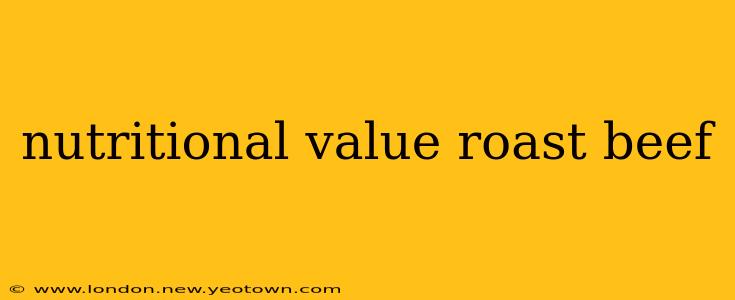Roast beef, a culinary classic, isn't just a delicious centerpiece for Sunday dinners; it's also a nutritional powerhouse packed with essential nutrients. From its high protein content to its rich iron stores, understanding the nutritional value of roast beef can help you make informed dietary choices and appreciate this versatile meat even more. Let's delve into the juicy details!
What is the nutritional content of roast beef?
The exact nutritional content of roast beef varies depending on the cut of beef, the cooking method, and the presence of added fats or seasonings. However, a general 3-ounce serving of lean roast beef typically offers a significant amount of protein, along with essential vitamins and minerals. Think of it as a complete protein source—meaning it contains all nine essential amino acids your body needs but can't produce on its own. This makes it crucial for building and repairing tissues, boosting immunity, and maintaining overall health. Beyond protein, you'll find a good dose of iron, vitamin B12, zinc, and niacin.
How many calories are in roast beef?
The caloric content of roast beef also varies depending on the factors mentioned above. A 3-ounce serving of lean roast beef can range from approximately 150 to 250 calories. However, fattier cuts and cooking methods that add extra oil or butter will significantly increase the calorie count. Remember that choosing lean cuts and opting for healthy cooking methods like roasting, grilling, or broiling can help you keep the calorie count in check while enjoying all the deliciousness.
Is roast beef good for weight loss?
Yes, roast beef can be a valuable part of a weight-loss diet when consumed in moderation as part of a balanced approach. Its high protein content promotes satiety, meaning it keeps you feeling full for longer, reducing overall calorie intake. Lean cuts of roast beef are particularly beneficial, as they minimize fat and calories. Remember though, portion control is key! Combining it with plenty of vegetables and whole grains will create a well-rounded, weight-management-friendly meal.
What are the health benefits of eating roast beef?
Beyond weight management, roast beef offers a variety of health benefits. Its high protein content is vital for muscle growth and repair, making it ideal for athletes and active individuals. The impressive iron content combats iron deficiency anemia, boosting energy levels and preventing fatigue. Vitamin B12, another nutrient abundant in roast beef, is crucial for nerve function and red blood cell formation. Furthermore, the zinc content supports a healthy immune system, helping your body fight off infections.
Is roast beef high in cholesterol?
Roast beef does contain cholesterol, but the level depends heavily on the cut of beef and the preparation method. Lean cuts tend to have lower cholesterol levels than fattier cuts. It's important to balance your cholesterol intake with other dietary choices and consult with your doctor or a registered dietitian if you have concerns about cholesterol levels. Remember that a balanced diet is key for overall heart health.
Is roast beef a good source of iron?
Absolutely! Roast beef is an excellent source of heme iron, a type of iron that's more readily absorbed by the body than non-heme iron found in plant-based foods. This makes it particularly beneficial for individuals who are at risk of iron deficiency. Including roast beef in your diet can significantly contribute to maintaining healthy iron levels, preventing anemia and enhancing energy levels.
This comprehensive look at the nutritional value of roast beef highlights its versatility and health benefits. By choosing lean cuts, employing healthy cooking methods, and practicing portion control, you can enjoy this delicious meat as part of a balanced and nutritious diet. Remember to consult with a healthcare professional or registered dietitian for personalized dietary advice.

